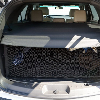These are some articals I found.
Tires Last Longer,Nitrogen is Safer Than Air, Tires Hold Their Pressure 30-40% Longer, Better Fuel Mileage and Handling, Fewer Tire Road Failures (Oxygen and Heat Destroy Tires), Lower Operating Costs.
Nitrogen has a much more consistent rate of expansion and contraction compared to the usual air. Often, a half pound of pressure will radically affect traction and handling. Nitrogen pressure is more consistent than normal air pressure because air typically contains varying amounts of water vapor due to changes in the relative humidity. Water causes the usual air to be inconsistent in its rate of expansion and contraction, And you will get unpredictable tire pressures. In one experiment involving 54 new truck tires, 33 were inflated with nitrogen and 21 were inflated with air. These tires were run side by side on the same vehical units until they failed or until they wore to the tread wear indicators. In this case the 54 new truck tires, nitrogen inflation resulted in 26% more miles being run before tires had to be removed when wear reached the tread wear indicators.
In the case of the failed tires a smaller percent of nitrogen tires failed physically (30% vs. 57%) and they gave 48% more miles before failing than did the air tires. This 48% improvement is due to the tire bodies lasting longer and not the better wearing properties of the tread which is the situation with the tires that lived to wear out.
The experiments involving 54 new and 44 used tires running some 7,345,497 tire miles in drive axle service, when viewed in light of the election microprobe experimental findings presented earlier, depict a clear cut picture of what nitrogen inflation can do for the transportation industry - cost wise as well as safety wise.














